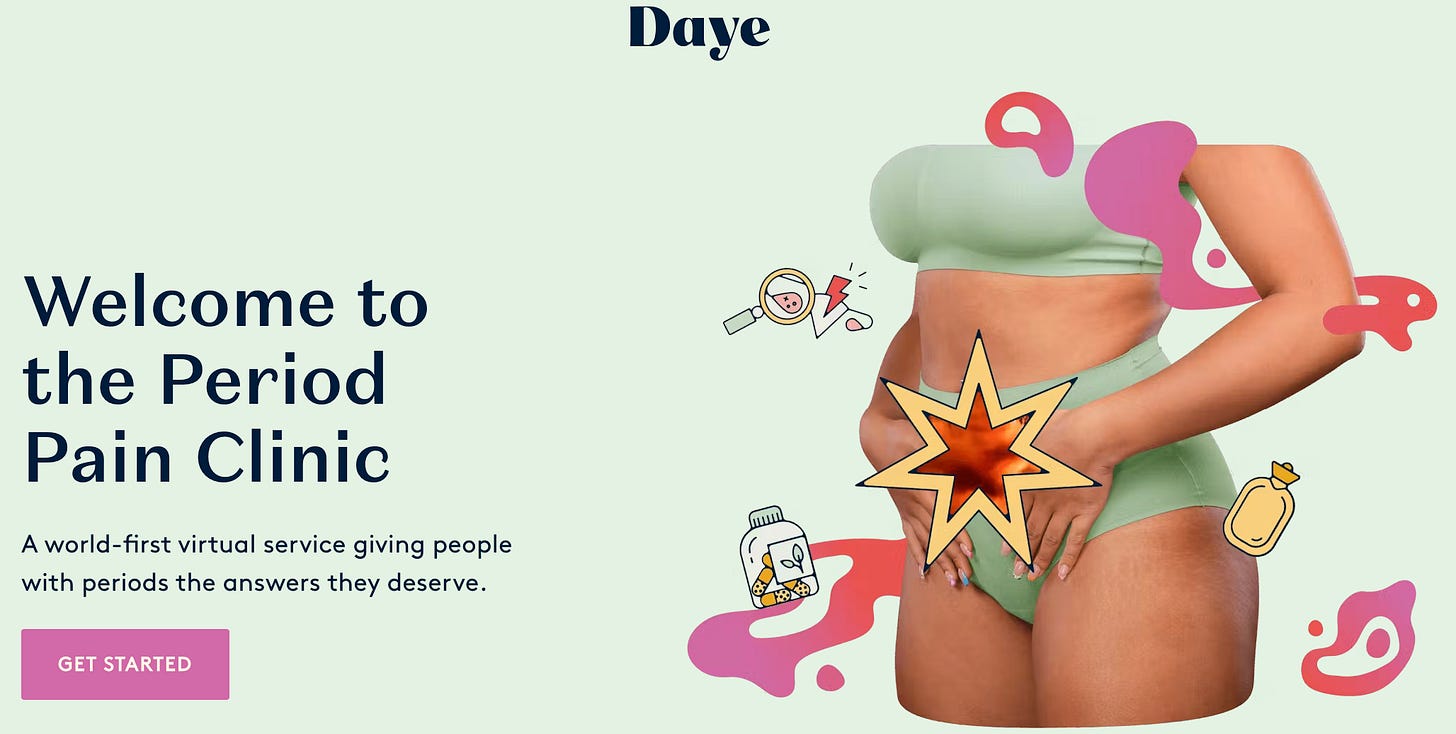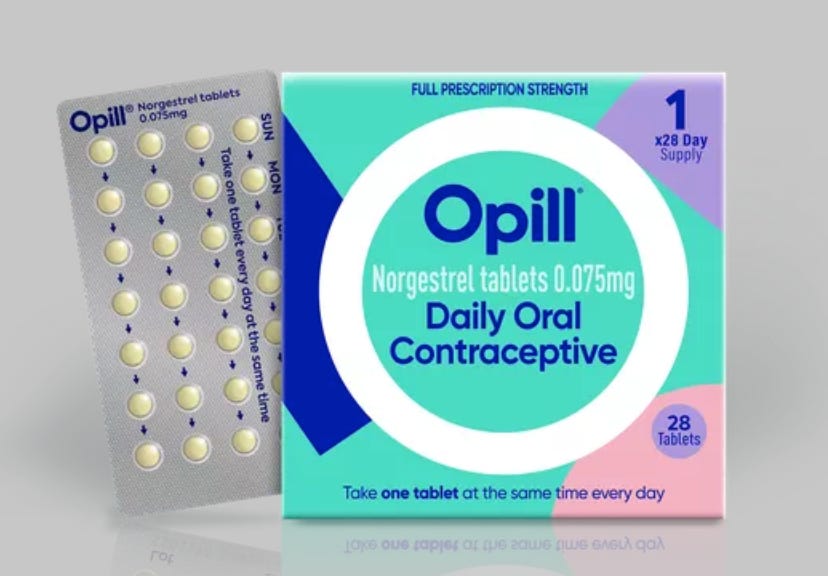Issue 13: Ad censorship pressure on Meta | attitudes to female founders profoundly different to men | Daye's world-first period pain clinic
+ lots more in your weekly news about women's health innovation and FemTech
Hi! How are you?
Welcome to FutureFemHealth, bringing you this week’s news and inspiration from the world of women’s health and FemTech (w/c 17 July 2023).
I’m Anna and whether you’re a founder, an investor, someone who works in women’s health / FemTech or are simply a fan, I’m glad you’re here to join me.
Coming up in today’s issue we’ve got:
Pain and gaslighting in women’s health spotlighted in new podcast The Retrievals.
Attitudes to female founders profoundly different to men - says new Pink Salt Ventures report.
Daye’s world-first virtual period-pain clinic opens.
Campaign of the week: More pressure on Meta to stop censoring women’s health ads.
And lots, lots more too.
🔥 “I could feel everything…nobody believed me” - pain and gaslighting in women’s health
Are you listening to the new five-part podcast series The Retrievals?
Here’s the story: Three years ago, at a fertility clinic at Yale University, a spate of women began to report excruciating pain while going through their egg collection procedures.
The concerns were explained away and fobbed off. The women felt like they were to blame.
And eventually - after up to 200 women had shared concerns - it was discovered that a drug-addicted nurse at the clinic was stealing Fentanyl and replacing it with saltwater saline, which meant none of these women received any pain medication during their procedures.
Which begs the question, how can a chorus of 200 voices be so repeatedly ignored?
While what happened is a single case of medical negligence, ultimately, it’s a story about the broader issues of women’s pain being dismissed or minimised, and how women are made to feel like they are at fault for not being able to withstand pain.
(The Retrievals is out now, hosted by Susan Burton)
Now, onto the rest of this week’s newsletter:
🌟 FemTech industry news
97% of female founders say they are treated differently to men
Pink Salt Ventures is calling for investor reform after a survey of 90 female founders found nearly all of them said they have been treated differently to men.
The survey also found:
83% said the lack of female decision-makers was a major barrier to funding.
76% feel that there is a lack of awareness of what constitutes an investable business.
In pitch meetings, female founders skew towards presenting more modest projections.
So what can be done?
Pink Salt (which has MPowder, Juno Bio and Hanx within its portfolio) is calling for reform of the investor landscape and emphasises in its report that the onus for transformation does not lie with female founders.
That said, it also offers a number of tips to female founders:
Pitch your best case scenario
Find investor communities supporting female founders
Build your network before you pitch
Know what constitutes a VC-backable business.
(Read the full report here - Pink Salt Ventures (2023). The Female Founders Report. Pink Salt Ventures.)
…But are female-led funds and more female investors always the answer?
Emma Rees, CEO and cofounder of Deployed, penned an opinion piece for Sifted this week suggesting that some of the biases in the VC world are actually perpetuated by women.
In her piece, Emma wrote that:
“I was ignored by the female VC partner who directed all her questions to my male cofounder (our head of product, who's also my husband). Another female VC asked: “Who will look after the kids, and does your husband know how to cook?” And I witnessed multiple female investors turn up late to “female founder office hours” and look at their phones. I know men do this too, but I expected more!”
(Read more: Sifted)
🌟 FemTech industry news cont.
‘World’s first virtual period pain clinic’ opens
Start-up Daye has created a period pain clinic, to offer virtual, fast access to support with a range of period-related symptoms and conditions. This paid-for service, allows users to complete a personalised health assessment before being connected to a range of specialists and treatment recommendations that are personalised to their symptoms, including Daye’s range of products where suitable. (Read more: Forbes)
Sustainable period care company &Sisters acquires menstrual cup makers Mooncup.
It’s a natural fit between &Sisters zero-plastic pads, tampons and liners, and Mooncups period cups. Together they share a mission to rid period care of plastic. (Read more: FemTech Insider)
$14m for French start-up Sonio and its prenatal screening assistant.
Sonio uses AI to analyse ultrasounds in real-time, before feeding back insights to practitioners. The start-up will now expand to the US. It says its technology can identify more than 300 potential prenatal syndromes and anomalies with an accuracy rate of at least 95%. (Read more: MedCity News)
$26m for Herself Health to focus on women aged 65 and older.
Herself Health plans to open up to 18 clinics across the US, offering holistic health support for women over 65 including mental health, mobility, social and behavioural health. It will also focus on specific health issues more prevalent in older women such as Alzheimer’s, osteoporosis and arthritis. (Read more: Crunchbase)
How is early-stage healthtech changing in Europe?
VC firm Octopus has released an in-depth report into the challenges and opportunities facing early-stage European healthtech. It includes deep dives into the landscape in the UK, France and Germany; an analysis of emergent trends, go-to-market strategies and current regulatory challenges; plus predictions for trends and tech coming in 2024. (Read the full report here - Octopus)
🩸 Research and women’s health news
Over the counter birth control will now be available in the US.
The FDA has approved the first over-the-counter, no prescription needed, oral birth control for the US. Perrigo’s Opill mini-pill has been selected. This change gives women safe, faster access to contraception. (Read more: FDA.Gov)
Your tampon is drowning in data - this company wants to study it.
NextGenJane is a start-up analysing used tampons to develop new diagnostic tools and treatments for diseases such as endometriosis. It’s currently relying on volunteers providing samples by post in the US - but hopes to eventually be in place in doctor’s offices too. We all take part in urine tests and do stool samples, so why not use our menstrual blood for diagnostics too? (Read more: Bustle)
New drug Donanemab is 'a turning point in the fight against Alzheimer’s'
The full results of a breakthrough Alzheimer’s drug were released this week (following early results in May). Alzheimer’s is a disease that disproportionately affects women and this drug is believed to be able to slow down the progression of the disease by more than 20% and in some cases up to 65% if begun early enough. The UK’s Alzheimer’s Society said this was a ‘turning point’ and “the first steps towards a future where Alzheimer’s disease could be considered a long-term condition alongside diabetes or asthma.” The drug will now go to regulators for approval. (Alzheimer’s UK
A step closer to faster diagnosis of Ovarian Cancer?
A promising study from the University of Nagoya in Japan has identified three previously unknown membrane proteins in ovarian cancer that could help act as markers for Ovarian Cancer and lead to faster diagnosis. Cancer Research UK’s Dr Samuel Godfrey (who was not involved in the study) explained that: “Researchers explored whether tiny ‘bubbles’ that come from ovarian cancer cells could act as warning signals for the disease, and their results suggest this approach could be worth exploring further.” (Medical News Today)
✅ Campaign of the week
The Centre for Intimacy Justice (CIJ) is calling on Meta to stop censoring content on its social media platforms related to women’s health.
Despite continued pressure from many organisations over the years (including a campaign by CIJ in Jan 2022), Meta still regularly rejects ads for menopause, menstrual health, fertility, breast health, reproductive health, pelvic pain, sexual wellness and more.
This is all while it continues to allow ads and content for men’s health such as erectile dysfunction.
For this campaign, the CIJ has partnered with a group of senators to send an open letter to the Federal Trade Commission (FTC) asking it to investigate Meta on the grounds of censorship of health information and access to critical health information.
Show your support: Sign the petition
Thank you!
That’s all for now. Until next time,
Anna
PS Last week I had the pleasure of joining a networking lunch and made new connections with people working in or supporting the women’s health and FemTech space. A shout-out to Hannah Wrathall and Capucine Cogne for organising and here’s a quick photo of us all together (can you spot my little 12 month old baby in the back?!)
PPS, Hannah writes a fab newsletter on the gender health gap, and each week she shares three ways you can help close the gap! Sign up here.







